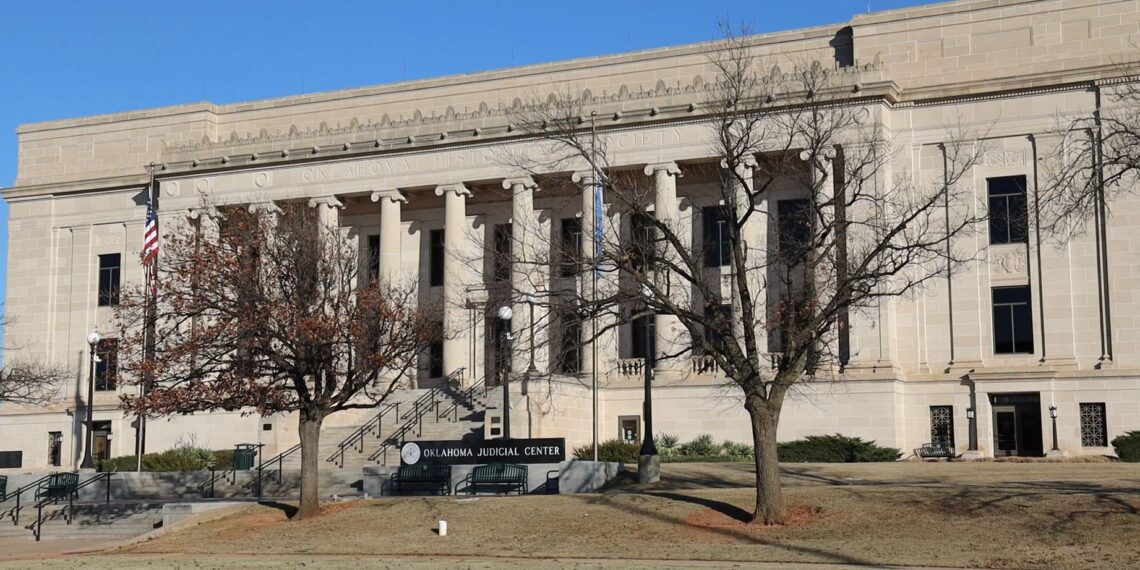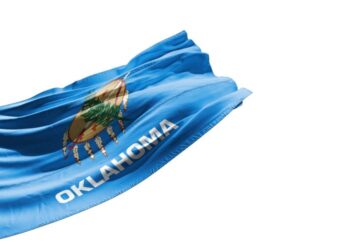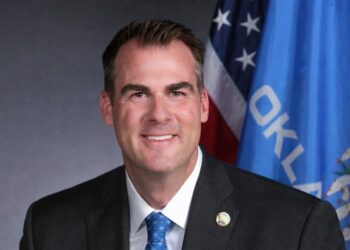OKLAHOMA CITY (OBV) – The Oklahoma Supreme Court heard arguments on Wednesday regarding whether State Question 832 (SQ 832), a ballot initiative that seeks to raise the minimum wage, should be stricken or allowed to go before voters in the upcoming November election.
All nine justices of the court were present for the hearing, which began at 10 a.m.
The Oklahoma Farm Bureau Legal Foundation and The State Chamber of Oklahoma jointly filed a formal protest in the the Supreme Court challenging the legality of SQ 832 in November.
“I think the Court today got a really clear explanation from our team about what our problems with the state question are. We think it’s blatantly unconstitutional. You can’t delegate the authority to raise the minimum wage away to an unelected and unaccountable federal agency,” said Chad Warmington, president and CEO of The State Chamber.
SQ 832 seeks to amend the Oklahoma Minimum Wage Act and increase the minimum wage by untying the state from the federal minimum wage. The amendment, if approved, would require employers to pay employees at least $9 per hour beginning in 2025, $10.50 per hour beginning 2026, $12 per hour beginning in 2027, $13.50 per hour beginning in 2028 and $15 per hour beginning in 2029. The wage will increase with the cost of living, beginning in 2030, as measured by the U.S. Department of Labor’s Consumer Price Index for Urban Wage Earners and Clerical Workers (CPI-W).
Oklahoma’s current minimum wage is $7.25
The court heard from Mithun Mansinghani, the attorney representing the Chamber and Farm Bureau, as well as counsel representing proponents of SQ 832 and counsel representing the Oklahoma Attorney General’s Office, which is challenging the constitutionality of SQ 832.
Some justices questioned Mansinghani’s argument that SQ 832 is unconstitutional. Here is an exchange between Justice James Edmondson and Mansinghani:
Justice Edmondson: I’m just struck by the fact that you’re raising a serious objection on constitutional grounds to this proposition and telling us not to do anything about it unless it becomes law and you’re conceding that the legislature has the ability to amend, modify or even repeal this proposition since you’re not tinkering with the constitution.
Mithun Mansinghani: Let me correct any misimpression I may have given. What we are asking for you to do is strike this initiative proposition from going to the voters. We think it’s unconstitutional and the remedy for that this court has embraced many times is to strike it from the petition. That is the consequence of proposing an unconstitutional initiative.
Edmondson: But you do not want that particular sentence that links the future to a CPI chain to be severed by itself.
Mansinghani: We don’t think that’s appropriate under the language itself or under this court’s precedent.
Mansinghani argued that the SQ 832 petition has a misleading gist, which is a short statement that explains what the initiative petition does. The court has longstanding precedent about what needs to be included or not in the gist to make sure that it is not misleading to voters so that people know what they are signing onto. Edmondson and Mansighani had a lengthy exchange over the petition’s gist:
Justice Edmondson: What in particular about the gist do you find to be manifestly corrupt or deceitful.
Mansinghani: I think what this court says that a gist must be free from the taint of misleading terms. I pointed out the two ways that we think it’s misleading. One, it says under this measure federal workers would be exempt from the OMWA when in fact they are already exempt from the OMWA. They wouldn’t be exempt under this measure. And the second is that it leaves out the most important consideration for small businesses, which is the cap on the $100,000 in revenue.
Justice Edmondson: And yet that is in the full text which is available to any potential signer of the petition to read if they have a question about the gross income of a corporation for coverage or not.
Mansinghani: Which is always true in every gist challenge, but at the same time, they would have no idea to even look to the measure to see what the gross income limit is because no gross income indication is ever given in the gist.
Justice Edmondson: Do you imagine that most of the people who are going to sign this petition or reject the invitation to sign it are going to read the full text of the measure?
Mansinghani: I don’t. I don’t have any hard data or statistics. I think the purpose of the gist, as set forth in state statutes, is to give the voters an ability to know what they’re signing about without having to read the full measure.
Justice Edmondson: That’s what the gist is for.
Mansinghani: Exactly.
Justice Edmondson: In your experience, how many people who are invited to sign this are going to read every word of the gist as summary as it is?
Mansinghani: I think more people than would read the words of the full proposition.
Justice Edmondson: I totally agree with you. Don’t you think most of the people would look at the gist and say, ‘Oh, this would raise the minimum wage’ and then decide ‘yes’ or ‘no,’ ‘I’m going to sign it’ or ‘not going to sign it’?
Mansinghani: It’s possible that they may believe that, but I think that the whole reason you have the gist is because there are many voters who are going to want more than just the four second version of what the proposition does. I think voters have both the right and the desire to be informed about what they’re signing.
Justice Edmondson: There will be a great deal of discussion about it, don’t you imagine in the days to come before it reaches the general election?
Mansinghani: After it gets on the ballot there would be if it gets on the ballot, but I think the point is there might not be during the whole circulation process and that’s why we need to be especially careful the gist is not misleading.
Justice Edmondson: I’m sure there will be lots of clarification made public. I hope we still have the League of Women Voters in Oklahoma doing their useful work, and no doubt the Chamber of Commerce and the Farm Bureau will be educating the public, at least to their point of view. So, there will be plenty of opportunities to look into this as deeply as any voter might want to.
Mansinghani: I think that would be true after it gets on the ballot, and I think that’s why we’re also careful about the ballot title, but I think before that, during their circulation period, and we’ve seen this in the past with other initiative petitions, there’s just not a lot of discussion of them while they’re still being circulated, and that’s the moment in time when the gist is particularly important and where it’s particularly important that the gist not be misleading.
“The Court asked some good questions, and I think our counsel did a good job of making the case. Beyond its unconstitutionality, SQ832 is an unnecessary solution in search of a problem that doesn’t exist in Oklahoma. The market rate for an hourly job in Oklahoma is far above $7.25,” said Warmington. “All the businesses that we have as members are having trouble finding people. They are paying far above that wage.”
Warmington said the state’s minimum wage rate is not the problem.
“We need to give more Oklahomans opportunities to upskill into the many available, high-paying jobs Oklahoma businesses have already created,” said Warmington. “There are thousands of good jobs paying far more than minimum wage but we don’t have enough personnel with those talents to fill the jobs. We’d like to focus more on developing and ensuring that Oklahomans have access to the education, training, and certifications that they need to fill the thousands of jobs that pay far more than minimum wage. That’s the problem that we ought to be seeking solutions together on. “
The Supreme Court is expected to come to a decision in the coming weeks.

















